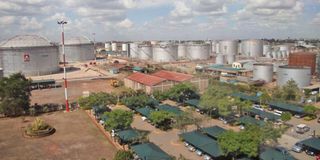13 pipeline staff under DCI probe over tax evasion

Kenya Pipeline Company storage facilities in Nairobi.
What you need to know:
- A letter signed by DCI officer Kuriah Obadiah to KPC asks the company to furnish the DCI with the 13 staffers’ wealth declaration forms and payslips for the period between 2013 and 2020.
Detectives have also requested for bank details of payments by KPC to Zakhem International for the period of construction to countercheck with invoices.
The Directorate of Criminal Investigations (DCI) is investigating an alleged multibillion-shilling tax evasion scheme by 13 staff of Kenya Pipeline Company between 2013 and 2020.
Detectives are investigating the loss of billions of shillings in taxes that would have been paid to Kenya Revenue Authority (KRA) as Value Added Tax (VAT) and duty for equipment and materials used in the construction of Kenya Pipeline Line 5 to replace Line 1. DCI boss George Kinoti confirmed the matter.
Of interest to detectives are reports that although KPC, through the Ministry of Energy, obtained tax and duty exemption from Treasury for all equipment and material used for the construction of Line 5, the exemption was not reflected in the invoices submitted for payment.
Mainland stations
It is suspected that the 13 former and current senior KPC staff who are under investigation facilitated Zakhem International to get the full payment, including the VAT and duty that was waived by Treasury.
A letter signed by DCI officer Kuriah Obadiah to KPC asks the company to furnish the DCI with the 13 staffers’ wealth declaration forms and payslips for the period between 2013 and 2020.
Detectives have also requested for bank details of payments by KPC to Zakhem International for the period of construction to countercheck with invoices.
Line 5, which stretches from Nairobi to Mombasa, was planned to have mainland stations at Maungu, Mtito Andei, Sultan Hamud and Changamwe, each with two mainline pumps. The new line has four transformers at the four pump stations.
The pipeline, which has a one-million-litres-per-hour flow rate, was expected to improve fuel supply to Uganda, Rwanda, and the Democratic Republic of Congo, and also reduce fuel fires, siphoning and over 800 tanker traffic on Kenyan roads.
KPC decided to replace the existing 450-kilometre Line 1, which had been in operation for over 38 years, with the new 20-inch-diameter line.
Sh6.9 billion
In June, a commercial court ordered KPC to pay the Lebanese firm Zakhem Sh4.6 billion within 30 days for a four-year-delay in construction of the line.
Zakhem International had filed a case demanding Sh6.9 billion for the works and Sh269 million as interest for the delayed payment, totalling Sh13.6 billion.
An international tender for the construction of Line 5 was floated by KPC in January 2013, inviting bids for the procurement, construction, testing and commissioning of the replacement line.
Zakhem International won the tender worth $484 million (Sh48 billion) and signed a contract on July 1, 2014 for an 18-month construction period commencing in August 2014 to February 2016.
On several occasions, Zakhem International raised concerns about faults in the engineering design submitted by Chinese firm Shengli.





